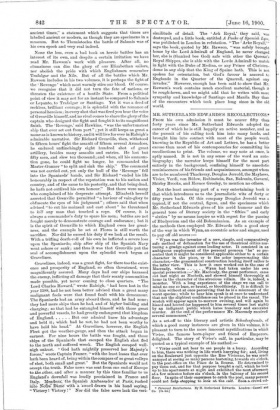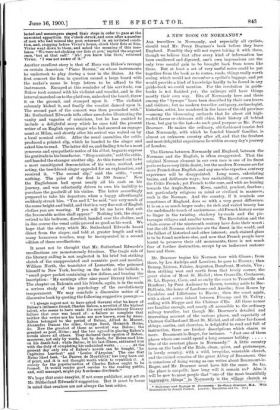MR. SUTHERLAND EDWARDS'S RECOLLECTIONS.*
FROM his own admission it must be nearer fifty than forty years since Mr. Sutherland Edwards adopted the career of which he is still happily an active member, and as the pursuit of his calling took him into many lands, and brought him into contact with most of the people worth knowing in the Republic of Art and Letters, he has a better excuse than most of his contemporaries for committing his recollections to print. The volume, we may note at once, is aptly named. It is not in any sense of the word an auto- biography; the narrator keeps himself for the most part entirely in the background, confining himself to anecdotic reminiscences of his friends and acquaintances, amongst whom are to be numbered Thackeray, Douglas Jerrold, the Mayhews, Vivier, Verdi, von Billow, Rubinstein, Sax, Bakunin, Gavarni, Shirley Brooks, and Horace Greeley, to mention no others.
Not the least amusing part of a very entertaining book is that which introduces us to the journalistic wits of forty or fifty years back. Of this company Douglas Jerrold was a typical, if not the central, figure, and the specimens which Mr. Sutherland Edwards gives of his acrid humour and the general tone of literary society in the " fifties " and early " sixties " by no means inspire us with regret for the passing of Bludyerism and the old Bohemianism. As an example of the methods then employed Mn. Edwards tells a good story of the way in which Wynn, an eccentric actor and singer, used to pay off old scores :—
"Wynn was the inventor of a new, simple, and comparatively safe method of defamation for the use of theatrical critics nur- turing a grudge against some leading actor. It consisted in an ambiguous employment of the personal pronoun 'he' so pre- sented that it might be considered applicable either to a certain character in the piece, or to the actor impersonating this character,—the grammatical construction lending itself rather to the latter view. This is how it once worked out in the case of Macready, whom Wynn had taken under his own special persecution :—‘ Mr. Macready, the great performer, came out last night as Macbeth, and showed himself thoroughly at home in the character of the atrocious villain. He is, indeed, a monster. With a long experience of the stage we can call to mind no one so base, so brutal, so bloodthirsty. It is difficult to see him without at once perceiving that he is a miscreant of the worst species ; while to hear him speak is at once to understand that not the slightest confidence can be placed in the rascal. The wretch will appear again to-morrow evening, and will again be hissed and hooted (as happened to him several times last night) by an indignant public which hates treachery and execrates murder. At the end of the performance Mr. Macready received several summonses."
As a set-off to this literary and artistic Schadenfreude, of which a good many instances are given in this volume, it is pleasant to turn to the more innocent mystifications in which Vivier, the famous horn-player and friend of Emperors, delighted. The story of Vivier's calf, in particular, may be quoted as a typical example of his method :— " Vivier could not bear to see people in a hurry. According to him, there was nothing in life worth hurrying for; and, living on the Boulevard just opposite the Rue Vivienne, he was much annoyed at seeing so many persons hastening, towards six o'clock, to the post-office on the Place de la Bourse. He determined to pay them out, and for that purpose bought a calf, which he took up to his apartments at night and exhibited the next afternoon at a few minutes before six o'clock, in the balcony of his second floor. In spite of their eagerness to catch the post, many persons could not help, stopping to look at. the calf. Soon a crowd col- • Personal Recollections. By H. Sutherland Edwards. London : Cassell and Co. US. 6d.) lected and messengers stayed their steps in order to gaze at the unwonted apparition. Six o'clock struck, and soon after ',number of men who had missed the post returned in an irritated condi- tion, and, stopping before Vivier's house, shook their fists at him. Vivier went down to them, and asked the meaning of this inso- lence. We were not shaking our fists at you,' replied the angered ones, 'but at that calf." Ah ! you know him then,' returned Vivier. I was not aware of it.' "
Another excellent story is that of Hans von Billow's revenge on certain American "Piano Barons," on whose instruments he undertook to play during a tour in the States. At the first concert the firm in question caused a large board with the maker's name in huge letters to be affixed to the instrument. Enraged at this reminder of his servitude, von Billow took counsel with his violinist and vocalist, and in the interval marched on to the platform, unhooked the board, threw it on the ground, and stamped upon it. "The violinist solemnly kicked it, and finally the vocalist danced upon it. The second part of the concert was then proceeded with."
Mr. Sutherland Edwards tells other anecdotes illustrating the vanity and vagaries of musicians, but he has omitted to include a delightful story which he once told the present
writer of an English opera singer who had secured an engage- ment at Milan, and shortly after his arrival was waited on by a local musical critic. After the usual amenities, the critic produced a printed slip, which he handed to the singer and asked him to read. The latter did so, and finding it to be a most generous and sympathetic notice of his eMbut, began to express his gratitude to his benefactor. "Stop a minute," said the critic,
and handed the stranger another slip. As this turned out to be a most unmitigated denunciation of his voice, method, and acting, the bewildered singer appealed for an explanation, and received it. "The second slip," said the critic, "costs nothing. The price of the first is 500 francs." Now the Englishman had spent nearly all his cash on his journey, and was reluctantly driven to own his inability to purchase the goodwill of his visitor. The latter accordingly prepared to take his departure, when a happy afterthought suddenly struck him. "You and I," he said, "are very much of the same height and build, and that is a very fine suit of English clothes you are wearing. If you will let me have that suit the favourable notice shall appear." Nothing loth, the singer retired to his bedroom, disrobed, handed over the clothes, and in due course the venal critic proved as good as his word. We hope that the story, which Mr. Sutherland Edwards heard direct from the singer, and told at greater length and with many humorous touches, may be incorporated in a second edition of these recollections.
It must not be thought that Mr. Sutherland Edwards's recollections are monotonously frivolous. The tragic side of the literary calling is not neglected in his brief but striking sketch of the unappreciated and eccentric poet and novelist, William North, the translator of Lamartine, who poisoned himself in New York, leaving on the table at his bedside a "small paper packet containing a few dollars, and bearing the inscription : My earnings after nine years' literary labour."
The chapter on Bakunin and his friends, again, is in the main a serious study of the psychology of the revolutionary temperament. We may conclude a discursive notice of a discursive book by quoting the following suggestive passage :—
" I always regret not to have asked Gavarni what he knew of Balzae's intimate friend, Charles Rabou, a novelist of the highest talent, who seems to have made the most extraordinary literary failure that ever was heard of : a failure so complete that neither the writer nor his books are now known, even by name. Rabou belonged to the period of Balzac, Alfred de Musset, Alexandre Dumas the elder, George Sand, Heinrich Heine, &c. Now the greatest of these as novelist was Balzac ; the greatest as poet, Heine; and the two agreed in placing Rabou's novels above all others. They declared their opinion of Rabou, moreover, not only by words, but by deeds, for Heine read him on his death-bed ; while Balzac, in his last illness, entrusted him
with the duty of completing his unfinished works At the present day only two of Rabou's novels can be bought, Le Capitaine Lambert' and Louise d'Arquien.' The one that Heine liked best, `Le l'auvre de Monthlery,' has long been out of print, and it is not thought worth while to republish it. A society for the popularisation of Charles Reboil ought to be formed. It would render good service to the reading public, and, well managed, might pay hIndsonie dividends."
We hope that some essayist, if not some publisher; may 34 on Mr: Mitherland Edwards'ET Suggestion. But it must be borne in mind that creators are not always the beet critics. •







































 Previous page
Previous page